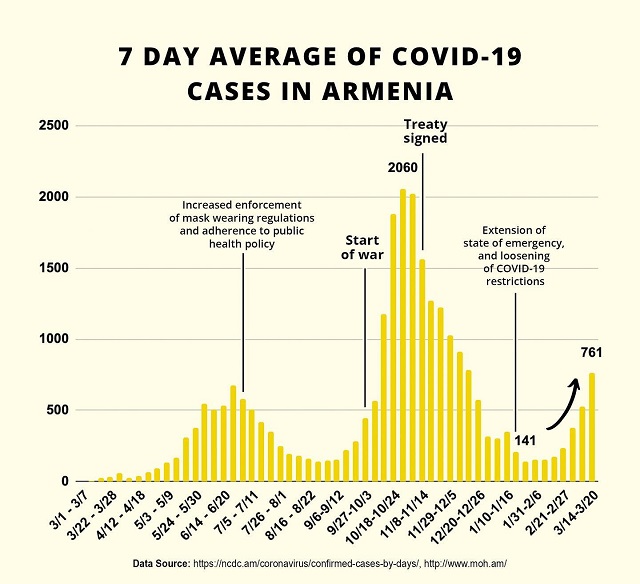Armenian health officials are sounding the alarm of a third wave of COVID-19 cases just as the country commences the vaccination phase.
Armenia experienced its first spike in coronavirus infections last summer, when the highest number of new cases registered in a day averaged about 676 in June of 2020. The initial surge in cases was eclipsed by the unprecedented rise in COVID-19 infections as a consequence of the 44-day war in Artsakh in the fall. In October of 2020, a peak seven-day case average of 2,060 new cases was confirmed.
The Office of the Human Rights Defender of Armenia published an ad hoc report this week classifying Azerbaijan’s invasion of Artsakh in the midst of the COVID-19 pandemic as a crime against humanity. According to the report, Azerbaijan disregarded the United Nations Security Council appeal for a global ceasefire for the duration of the pandemic, initiating a “human-made disaster” against Artsakh and Armenia and “intentionally [accelerating] the rapid spread of the deadly virus.” Article 7 of the Rome Statute of the International Criminal Court defines a crime against humanity as an act “committed as part of a widespread or systematic attack directed against any civilian population” that “intentionally [causes] great suffering, or serious injury to body or to mental or physical health.”
Read also
The most recent rise in coronavirus infections following a loosening of COVID-19 restrictions on public gatherings has already surpassed the data registered last summer. On March 23, 1,164 positive cases were reported from 5,330 tests. Armenian Minister of Health Anahit Avanesyan previously warned of a steady increase. “As of yesterday, we had 491 positive findings or 16-percent out of a total of 2,922 tests,” she said on March 4. “Only five- to seven-percent of the tests conducted were positive in January and February. We can see that the toll has increased to 16-percent, and forecasts show that this figure will be up again next week.”
The compounded impacts of the war and the pandemic impaired the capacity of the healthcare system during the second wave of coronavirus cases in the fall. About 32 medical centers were repurposed to provide care to wounded soldiers and civilians. The contemporaneous spike in COVID-19 patients requiring hospitalization produced a deadly bed shortage that prevented individuals from seeking medical care.
Most medical centers in Armenia have returned to their original functions following the end of the war. Currently, 12 hospitals are treating COVID-19 patients, and new hospital beds are being added. However, the Ministry of Health cautions that the number of vacant hospital beds is finite, and stricter adherence to mask-wearing and social distancing measures will be necessary to prevent the spread of infection.
Inoculations against COVID-19 are underway as the Health Ministry launched the first stage of its vaccination campaign. During its first phase of vaccinations, the government intends to inoculate health care workers, nursing home residents and employees, social workers, 65+ individuals and those between the ages of 16 and 64 with chronic illnesses against the virus. Lecturers, educators, employees of the Ministry of Emergency Situations, military servicemen, public transit workers, civil servants and those who work in the field of justice will receive the vaccine during the second phase.
The government has approved the purchase of COVID-19 vaccines produced by British-Swedish pharmaceutical company AstraZeneca through COVAX and the Russian-manufactured Sputnik V. COVAX is a global distribution initiative with 190 participating countries to ensure equitable access to COVID-19 vaccines regardless of income level through collaboration with the World Health Organization, UNICEF, the World Bank and Gavi. While the Health Ministry hoped to distribute doses of the AstraZeneca vaccine in March of 2021, protracted negotiations have delayed delivery of the first batch of the vaccine. Instead, vaccinations of healthcare workers have commenced with Sputnik V.
According to recent trials, the Sputnik V vaccine demonstrates 92-percent efficacy against COVID-19 and 100-percent efficacy against severe cases. Adverse events among trial participants were determined to be unrelated to the vaccine. AstraZeneca announced that its vaccine proved effective against symptomatic COVID-19 in 79-percent of cases and against critical disease or hospitalization in 100-percent of cases. However US health officials questioned this data, asserting that the vaccine is probably between 69-percent to 74-percent effective.
Armenia has recorded a total of 186,184 cases of the coronavirus since the start of the pandemic; 3,398 people have died.
In the political arena, long-awaited snap parliamentary elections will take place on June 20. PM Nikol Pashinyan announced this decision following a meeting with the Prosperous Armenia Party head Gagik Tsarukyan, during which they agreed that “the best way out of the domestic political situation is extraordinary parliamentary elections.” The ruling My Step alliance and the Bright Armenia faction had both previously declared their readiness to participate in early elections under the condition that neither of the parliamentary opposition parties, including Prosperous Armenia, field prime ministerial candidates. Since Prosperous Armenia has now accepted this measure, the prime minister must resign within the upcoming days so that parliament may be dissolved.
Ahead of parliamentary elections the National Assembly has voted to lift the state of martial law, introduced at the start of the war with Azerbaijan in September of 2020. The draft decision was introduced by the Prosperous Armenia and Bright Armenia parties and passed easily with 118 of 132 possible votes. While the opposition factions have been calling for the abolition of martial law since the end of the war, the My Step alliance has stalled the move until now.
The My Step alliance also stated that it is prepared to make changes to the electoral code preceding the nationwide elections. According to a recent survey, 74-percent of the population believes that the electoral code needs to be reformed. Discussions on electoral reform Bill C-894 have been ongoing since the summer of 2018. Among other changes, the bill would eliminate the open proportional, or “ratingayin,” system, under which the number of seats a political party receives in parliament fluctuates based on local support. This system would be replaced by a closed proportional system, under which voters choose between parties rather than candidates.
Finally Artak Davtyan has replaced Onik Gasparyan as Chief of the General Staff of the Armed Forces. The PM issued a dismissal order for Gasparyan after the military brass released a statement on February 25 calling for his resignation. On March 10 the PM’s office submitted a proposal to the President’s office regarding Davtyan’s appointment to the position of Chief of the General Staff. While the President did not sign the proposal, he did not challenge the decree in the Constitutional Court either, allowing the appointment to come into effect. Davtyan previously held the position between 2018-2020.
Lillian Avedian
Photo Caption: 7 day average of COVID-19 cases in Armenia (Photo: Armenian Public Health/Araz Chiloyan)


























































